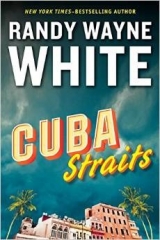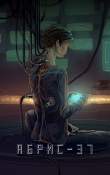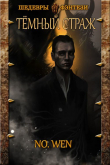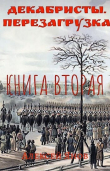
Текст книги "Cuba Straits"
Автор книги: Randy Wayne White
Жанры:
Политические детективы
,сообщить о нарушении
Текущая страница: 4 (всего у книги 17 страниц)

As applause died down, Figueroa Casanova, enjoying his first ride on a sailboat, waved both hands at the crowd on Mallory Square and asked Tomlinson, “Brother, how’d you get so famous in Key West? Must be a hundred women, but the men, even that juggler, they’re clapping, too.”
Tomlinson, at the wheel, was kicked back, steering with his feet. “Naw, man, they do this every sunset. Hey . . . mind digging out another beer?” He pointed, wearing frayed shorts and a T-shirt that read BUM FARTO, CALL HOME.
Figgy had puzzled over the strange American words, but his interest had moved on. “They clapping just because the sun goes down?”
“Like a tradition, yeah.”
“Brother, you’re too modest. Every day since I was born, the sun comes up, it goes down, except in prison—no windows in my cell, you know?—but I’m pretty sure it happened anyway. Why they so happy about night coming?”
Tomlinson cocked his head. “You did time? Why’d the pigs lock you up?” Which, even to him, didn’t sound right in Spanish, so he translated, “Cops, I mean. Not ‘time’ as in clock time.”
Figgy replied, “I don’t need a clock to know night from day when I see it.” He couldn’t take his eyes off so much activity, flaming torches, cats jumping through hoops, and too many gringas with nice chichis to count. “No, this afternoon I’d of noticed any pretty fans from the dugout. Those women, they looking at you, brother.” He opened the Igloo, grabbed two beers fast so as not to miss anything.
Tomlinson considered what he’d just heard while his eyes lived in the moment: tourists and locals packed along the seawall, tangerine clouds over the Tortugas, the air sweet with coconut oil, Gulf Stream jasmine, and some professional-grade weed that only a true pirate town could handle with dignity. A slow turn of the head and there was Key West Bight, the Turtle Kraal docks busy where he often tied his dinghy, although the sandy spot at the end of Simonton was better for swimming naked.
Whoops . . . His head jolted and pivoted the other way. Christmas Island astern, a colony of sailboats floating where, three weeks ago, he’d moored No Más before taking a taxi boat, the Magic Penny, ashore. Then late this afternoon, after the ball game, the same in reverse but with a stop at Fausto’s Food Palace to buy provisions, then another stop at Marine Hardware on Caroline. No charts of Cuba available, but hemp for a boom vang and extra shackles might come in handy, as would oil for the dinghy’s little Yamaha outboard, boat and motor both secured forward atop No Más’s cabin.
The baseball team from Indiana had slipped a hundred bucks to Figgy, who’d picked the field clean and gone four for five with two RBIs. Only a Coors Light to the scraggly-haired pitcher who’d closed the game—no runs, but three duck-fart bloopers beyond the range of Indianola Cadillac’s limping, over-the-hill fielders. Tomlinson was still peeved about that. But he had gotten the save and paid for provisions anyway.
No problem. He’d inherited a family fortune, but that wasn’t the reason. The last thing he’d expected was the little shortstop to ask to accompany him to Cuba, and the chaos he’d recently escaped, all because of a promise he’d made to watch the briefcase.
The deal was done when Figgy finally perused the letters and saw what they contained.
Comrade, Tomlinson thought, I am proud to have you aboard.
Honor . . . conviction . . . loyalty—the little dude personified everything good about the Revolution, which, of late, had been made a mockery by snot-nosed dilettantes and political traitors. This sad truth had brought Tomlinson near tears more than once. He accepted the beer, sopping ice chips with his shirt, and toasted his new shipmate. “Solidarity, man.”
Figgy was wary of political slogans. He demurred by asking what BUM FARTO, CALL HOME meant.
“That’s what everyone called the guy. Bum. He was the fire chief in Key West years ago. One night, he got in his car and was never seen again. Farto, his real name. Seriously. Which reminds me . . .” Tomlinson checked his phone, seeing his last text to Ford, which read Sailing south on a righteous mission. Stop your damn worrying. He switched it off and added, “You can’t be too careful down here on the Keys.”
Figgy had refocused on a group of gringas, five or six with their chichis bouncing while they yelled something across the water. “Those women love you, brother. Modesty, yeah, that’s sometimes good, but it won’t get you no papaya. Maybe they’d enjoy a boat ride—make some hot oil with us. You think?”
Tomlinson smiled at the Cuban slang and checked Mallory Square. Yes . . . a redhead and a blonde he recognized—possibly several familiar faces jumbled back there in memory. Over the years, he’d dropped anchor in bedrooms from Duval to Cudjoe Key, but women always looked so different wearing clothes instead of body paint. He replied, “Those whom Key West does not kill, it enlightens. That’s why we’re not turning back.”
It was more strange talk from this odd pitcher who didn’t throw hard enough to break glass but had a pretty good curve. Figueroa liked him anyway, trusted the man’s kindness and sophisticated manner. Felt comfortable enough to speak up when he didn’t understand. “You mean ‘kill’ as in putas who rob? Or these island women, they exhaust a man’s pinga?”
“Count on it,” Tomlinson replied. “It’s happened to better sailors than us. That’s why I know when to pull anchor and haul ass to saner harbors.” He stood to ready the mainsail. The shipping channel, busy with traffic and sunset pirate vessels, required an engine. Once clear of Kingfish Shoals, however, they would be free if there was wind . . . But, damn it, there was no wind. The low-pressure system had left a vacuum of calm that would make them a puppet of the Gulf Stream . . . until morning at least, according to the VHF under the helm, which he knelt to turn louder.
“But they’re callin’ your name, brother.”
“Yeah? Think back to your Greek tragedies—‘Beware the Sirens on the rocks’ and all that. Odysseus dropped anchor and Circe, plus some other witch goddesses, drugged him, screwed the man blind, and kept him and his shipmates captives for a year.”
Figueroa’s eyes were fixed on Mallory Square. “They’re witches?”
“Circe? Hell, yeah. Spellbinders, they all are.”
“If Circe’s the one I’m looking at, sometimes a year don’t seem so long.”
Tomlinson replied, “Hush a minute,” and listened to NOAA weather’s monotone: seas outside the reef three feet or less until morning, when a high-pressure band increases wind slightly to . . .
Figgy didn’t attempt to translate those foreign words. Still waving at the eager gringas, he endured a sense of loss unknown since his first month in Havana’s prison psychiatric ward. “Brother, isn’t there some way?”
Tomlinson muttered, “Damn. Apparently not,” and switched off the VHF.
Figgy suggested, “How about I swim to shore? Allow me, oh . . . just two hours. Shine a light and I will swim back. I don’t doubt what you say about those witches, but I have never experienced this tragedy you fear.”
Tomlinson slouched behind the wheel. “The weather gods usually ignore NOAA’s doom-and-gloom bullshit when No Más goes to sea. Apparently, my vibe’s out of kilter.” He looked at the horizon, a turquoise glaze to Cuba, then at his new shipmate. “Mind rolling a skinny—my Spanish seems to be fading.” Then: “What was that last thing you said?”
• • •
OVER MARGARITAS at Louie’s Backyard, Tomlinson had to lie. “Cerci in Cuban means ‘a beautiful, sensual woman.’ Women, in your case. See? It’s not that my amigo can’t remember names.” Explained this to three German nurses who had intercepted them after No Más was illegally anchored off Dog Beach, where their dinghy was tied—an Avon inflatable that had rocketed them to shore and was visible from their table near the tiki bar.
Next, a question about the shortstop’s shoes. “Baseball spikes, we call them,” Tomlinson explained. He signaled the bartender, indicated their empty pitcher, and called, “I think we’re prepared to sail again.”
Figgy disappeared after that with one of the Cercis who was infatuated with the rhythm of his name: Figueroa Casanova. Kept repeating it like lyrics to a song, which was okay. It warmed the long silences at a table where only Tomlinson spoke English.
Twenty minutes later, Figgy and Cerci reappeared from somewhere beneath the deck, both a little woozy.
“Mission accomplished,” Tomlinson whispered. “Now, let’s hit the dinghy and get under way.”
Figueroa tapped his wrist as if he owned a watch. “You promised two hours. It is hardly dark yet. Oh”—he stole a look under the table—“thanks, my brother. Next time, I carry that with me.”
The briefcase, he meant. He’d insisted they bring the thing, a last-minute fire drill that had tumbled Tomlinson into the water, but this was not the first time he’d used soggy bills to buy drinks.
On Thomas Street, they popped into Blue Heaven, the outdoor seating fragrant with frangipani and scrawny, scratching chickens. In response to the hungry look Figgy awarded the fattest hen, their server warned, “Don’t you dare—they’re protected.” That hastened them on to Margaritaville and another frosty pitcher in tribute to a generous man. By then, a fourth Cerci had hinted she was seducible—this one from the Wolverine State, a stunning Ph.D. candidate who played rugby and had the scars to prove it. “I’ve got a room at the La Concha,” she said into Tomlinson’s ear. “Just me. Bring the Krauts, if you want, but no more than two, and no less than three.”
Talk about cryptic. On a napkin was her room number, and an addendum: “Love the name Cerci. Much cooler than the name I’ve been using.”
Hmm. Tomlinson was aware that women journeyed to Key West eager to try what was unthinkable back home, yet he fretted for the coed’s innocence, and all the innocents who had run amok on the rocks of Bone Key. What to do?
He thought back. Long ago, he had earned his doctorate with a dissertation that became an international best seller: One Fathom Above Sea Level. A “fathom” being six feet—the distance between earth and one man’s eyes. A line he’d written offered guidance: When torn between doing what is morally right or the chance for a few hours of fun, never decide until morning.
After that, the streets of Key West assumed their normal spatial focus, which is to say fuzzy . . . not unlike embedding marbles in one’s eye sockets and watching the babysitter swim naked at nap time.
Cerci, the one from Berlin, had listened patiently to this tale of boyhood emergence, but Cerci, the Wolverine Ph.D., had bigger adventures in mind. “Eat this,” she said.
Tomlinson considered the pill she squeezed into his palm. “Mescaline?”
“Think of it as a time capsule.” A sharp, perceptive smile while she continued: “I knew it was you. I’ve read your book at least ten times, and the last chapter still makes me cry.” A slight sniffle, then a brighter smile. “Mind if I snap a selfie to send a few friends?”
Her phone was on the nightstand, two topless fräuleins away.
Flash . . . Flash . . . Flash-Flash. Blinding, but the strobe helped the mescaline unfurl gently throughout Tomlinson’s brain. Time to show some real American know-how and put his back into the task at hand.
He did.
Yes . . . this corn-fed Cerci was the real McCoy, a true spellbinder. Yet, some passage of time later, on Duval Street, Tomlinson experienced a disturbing moment of clarity when a bear-sized man shouldered him off the sidewalk and muttered what sounded like a threat in Russian. Then again, at the corner of Southard and Margaret, when Figgy, standing shirtless, briefcase in hand, froze as he stared into the darkness of trees, where there were tiny columned mansions and row after row of stones.
“What’s wrong?”
“Brother, we being followed. You see him?”
Tomlinson mustered his motor control and did a slow turn. “Hey . . . where’d our Cercis go? I’ve become very fond of that spunky little Wolverine.”
“It because of him, brother. The witches, they all ran.”
“What? That damn trollop . . . she used me like a hood ornament. Shit . . .” He searched his pockets, shorts still wet for some reason—oh yeah, they’d crashed Pier House Beach for a swim, but his dripping billfold had survived. His iPhone present, too, but iffy. “Well, she’s no thief. I’ll give her that much.”
“Shhhh!” The Cuban clutched his Santería beads and stood motionless like a dog flagging a snake. Then gestured with his chin. “Outside the wall by the tree. See? I hope it’s not him.”
“Him who?”
“A Santero from my village, but an asshole. ’Cause of him, I got sent to the crazy prison for murder.”
“Gad, Figgy. You killed someone?”
“Or could be that Russian who called you a pussy.”
Sobering, to hear such words. “That’s even more upsetting. No one’s supposed to know I’m here.”
“Santería, my brother.” Figgy whispered the words as if they explained everything.
To Tomlinson, they did. Santería, voodoo, were mystic religions, and even a Santero, which was a novice priest, would have powers far beyond the norm. A Russian, not so much, but formidable—the guy had resembled the fruit of a Cossack screwing a grizzly. Tomlinson took stock. He squinted again, seeing rows of stones and flags and miniature stone mansions that were . . . mausoleums?
A cemetery . . . Christ, how had they stumbled this far off course?
Figgy nudged him. “No . . . he’s behind us.”
A turn of the tiller. Streetlights on Southard spilled pools of yellow onto asphalt, each pool smaller, block after block. Banyan trees shadowed sidewalks and the occasional utility gizmo, such as a fire hydrant or a post office drop box. After many seconds, Tomlinson relaxed and pointed. “Is that what scared you? It’s just a mailbox, for christ’s sake. How tall is this guy?”
“Even bigger than me, but that’s not him. He must’a moved, the son of a dog.” Figgy shuffled closer to the drop box, shoes clicking like a shod horse.
“Tell me something. Did Cerci give you a pill to eat?”
“Maybe. And some dollar bills that got the wrong pictures on them.”
Deutschmarks, Tomlinson translated. “Not the German. I’m talking about the Cerci with small chichis. Or she could have roofied your beer. Frankly, I don’t think that my little Wolverine is the squared-away feminist she pretends to be.”
Figgy did it again: froze. His head swiveled shoreward to an antebellum house dark beneath trees, a few stars, but no moon showing. “Madre de Dios,” he murmured.
“Now what?”
“He’s coming, brother—run.”
The Cuban’s spikes sparked toward the cemetery, briefcase swinging, while Tomlinson hollered, “Dude . . . you can’t outrun mescaline.”
Too late. Unless . . . unless the little shortstop’s fears were reality-based. If so, darker forces might be at work here.
Beelzebub—still on my trail, huh? Good! Tomlinson, a pacifist by choice but a spiritual warrior by nature, had been anticipating such a visit. He hollered toward the shadows, “Pleased to meet you—now kiss my ass.”
A fence of wrought iron separated the house from the street, metal cool to the touch. The gate wasn’t locked when he tried it. Beside the porch, bushes parted with the tinkling of wind chimes. Two creatures appeared in the form of human shapes, one bear-sized, the other smaller. Teeth flashed a Rottweiler grin, followed by a cough of Russian.
Tomlinson stood his ground. Waited, expecting the worst, but the specters retreated. Soon vanished, as if circling behind the house.
More wind chimes on this dense, still night.
Tomlinson yelled after them, “Now who’s the pussy?”

Upstairs in the rental cottage, Gen. Rivera said to Ford, “He came to assassinate me with a Beretta? I, too, like Berettas. At least that shows some respect.”
Ford put the gelatin listening devices in the freezer and closed the door. “You need to pack up and get out of here, that’s what it shows. Where’s your suitcase?”
“You don’t understand. I was on the phone with . . . well, a person I trust. He warned me about something they might try to do to me. Radiation poisoning—a horrible thing. Your hair falls out, and you shit yourself to death.” At the window, Rivera opened the blinds to see where the Suburban had been parked. “You should have brought that puta to me. I know ways to make men talk.”
Hector had talked, but Ford hadn’t volunteered all that he’d learned. “Poison? Why?”
A shrug. “A microscopic grain of something, an isotope—already the name is gone. They jab you with a needle or slip it into food. From their rocket program. It’s the way that . . . the way they do things now.”
Jesus Christ. Rocket program—it had to be the Chinese or the Russians. No, it was the Russians. The overcomplicated, Cold War style left little doubt. Ford asked, “Are you sure?”
“Two of my contacts in Cuba are dead. I just found out. Another is in intensive care. A woman . . . quite beautiful”—Rivera sounded sad and a little wistful—“who has, over the period of a week, lost her beautiful hair. A bullet—I’d much prefer a soldier’s death. Shitting is no way for a man to die.”
An hour after sunset, they dropped the Mustang at Hertz. On the way to the airport, Ford turned the radio off and said, “General, I need to know what’s going on.”
The former dictator replied, “I can’t fly out until I’ve found Figuerito. How many times must I say this? That stadium sign we passed, why not stop and have a look?” They had already passed the Twins stadium, but the Red Sox complex was ahead, the lights of the practice fields aglow.
Ford seldom lost his temper but came close. “Goddamn it, Juan, I just saved your life. Enough with the bullshit. Why are they after you?”
Rivera stiffened but let it go. “The world has turned savage, old friend. I knew I was being followed, but I thought it was because of my new sports agency business.”
“Smuggling baseball players, you mean.”
“Phrase it how you like. What I’m telling you is, now I’m not so sure. I was cultivating a variety of businesses in Havana. At first, I thought the Mexican cartels, or the Cubans. That I might have stepped on the wrong toes. This American dream of yours can bite a man in the ass, which your propaganda fails to—”
Ford interrupted, “It has nothing to do with baseball. Russians don’t give a damn about Cuban ballplayers.” He had yet to allude to the contents of the briefcase but did now. “For the last decade, outsiders have been stealing collectibles from Cuba. Paintings, historic items. Suddenly, Russia and Cuba are allies again. You know what I’m asking you—the stuff you’ve been selling on the Internet.”
Rivera rode in silence until he realized the turn to Southwest Regional was before the Red Sox complex. He slapped the dash. “I have to find Figuerito! Must I write my orders on paper?”
“I didn’t enlist in your army, Juan. Tell me why the goddamn Russians are involved.”
“I didn’t say they were.”
Stubborn bastard. Ford drove and used the silence to put together a workable premise. Letters written by Fidel Castro between 1953 and 1963—a tumultuous period. Batista ousted, 1959. The botched Bay of Pigs invasion, 1961. Next came the Cuban Missile Crisis; the Berlin Wall was erected. The CIA attempted to foil the execution of three hundred anti-Castro operatives, and they had botched the first of several attempts to take out Fidel. Then 1963: JFK assassinated, November 22nd. Oswald killed; Jack Ruby dies. The whole time, a lot of backdoor nastiness between clandestine agencies worldwide. Riots and protests fired by the accelerant of KGB money. East Berlin, Saigon, Nicaragua, El Salvador—same thing but financed by American dollars.
The biggie, of course, was JFK. Conspiracy theories about Ruby, the Mafia, and Fidel’s orders to “Kill Kennedy” were still believed today.
But it was bullshit. Decades later, for professional reasons, Ford had studied details of the event. He had filled a folder with notes from investigations by the Warren Commission, the House Select Committee, and had even played a much later role in debunking Congress’s antiquated confidence in so-called sonic experts. They had insisted that a lone gunman could not have fired three rounds—or was it four?—from a bolt-action rifle in less than six seconds.
Once again, bullshit. Yet, every twenty years or so, some esoteric government agency ordered that it be proven. Ford was not a gifted marksman, let alone a Marine Sharpshooter, but even he could put three rounds into a moving target from only fifty-nine yards away—and in less than six seconds. An FBI shooter, using a clone of Oswald’s rifle, had done it in only four.
But there was still one sensitive unknown out there. It had been overlooked even by fringe feeders like movie hack Oliver Stone and other conspiracy profiteers. The Castros didn’t kill JFK, nor did the CIA, the Soviets, or the Mafia. The only valid question was: Did Fidel and the Soviets know, six weeks before the assassination, that Lee Harvey Oswald had visited the Cuban embassy and vowed to do exactly what he did?
Love letters. Ford tried to imagine why the Castros would reveal sensitive information to a mistress. It seemed unlikely . . . So why, fifty years later, did the Russians care?
“Damn it, Juan. Uranium poisoning? I’m not stupid. Talk to me.”
Rivera set his jaw and glowered. That did it. Ford pulled off the road, his truck’s headlights showing weeds and a yellow sign that read Panther Crossing while traffic sped past. “Okay, I’ll try another approach. What’s so important about that shortstop? He’s too old to sign with a major league team—don’t lie to me. Why did you bring him to the States?”
“Lie to you?” Rivera’s temper bordered on the berserk. He was famous for it. He shifted his weight in the seat and glared. “You are calling me a liar?”
A stare-down, but it was the general who blinked when he realized what he’d just heard. “Wait . . . How do you know Figuerito’s age? All I said was that he has no birth certificate.”
“Tell me why it’s worth risking your life to find him. Then I’ll explain.”
A light came on in the general’s head. “By god . . . you know where he is.”
Ford nodded, listened to a series of threats, before he repeated, “Tell me the truth.”
It wasn’t a long story, but he parked again—this time, in the airport’s cell phone lot—to listen to Rivera conclude, “That’s why I trusted Figuerito to keep the briefcase, even though I could find no electronic device inside.”
“You still haven’t what’s in there.”
Rivera used his hands to say I’m not done. “The point is, I was still being followed. Now I’m worried they are following Figuerito, too. That they’ll stick him with a needle, like my beautiful friend who has lost her hair. That’s why I must find him, then return immediately to Cuba.”
“I’ll be damned. You actually care about the guy.” Ford didn’t pose this as a question.
“He is a simpleton, that shortstop, but very honest—also crazy, from what I’ve been told. Perhaps these Russians will be the lucky ones if I find him first.”
“You mean he’s dangerous?”
Rivera replied, “I think not, but who can say what is in a man’s head? My friend on the phone continues to warn me that Figuerito is a violent psychopath. Even the warden I bribed described him as a serial killer without conscience, so . . .” The former dictator lowered the window to watch a plane land, his mind slipping back in memory. A bemused smile formed. “Of course, as you know, there are people who say the same about me.”
• • •
A LITTLE BEFORE TEN, Ford got an NA beer and sat at the computer in his lab. Across the room, the dog opened one yellow eye to watch, seeing Ford’s familiar size, lighted water boxes and odors behind him, then heard the man’s familiar voice.
“That damn Tomlinson, not a word since his stupid text. So maybe there’s an email . . . if he wasn’t too blitzed to find an Internet café.”
Sailing south on a righteous mission . . . don’t worry the text had read.
Ford used two fingers to rap at the keyboard, his wire glasses silver beneath a gooseneck lamp, while he spoke to the retriever: “If there’s nothing to worry about, why the hell doesn’t he call? At least have the courtesy to give me an update. Oh . . . I bet I know—a waterproof phone case is pointless if he doesn’t use the damn thing. Or, just thoughtless. Yeah, thoughtless, that’s him.”
More typing. The dog’s yellow eye closed; he returned to sleep while the alpha figure spoke, occasionally, in a tone that communicated nothing, but tilted his head when he heard “What the hell?”
Ford’s neighbors Rhonda and JoAnn, who lived aboard an old Chris-Craft, Tiger Lilly, had sent an email, subject: Man of the Year. There were photos of Tomlinson, naked on a bed, posing with three topless women—two large-breasted blondes, the other dark-haired, younger and attractive, despite cat whiskers painted on her face. Little tufts of horns on her temples, too, which caused her to resemble a woodland creature with teeth.
Ford was no prude but closed the photo after reading Rhonda’s note:
Copied from Facebook just now before they took it down. 726 likes. Capt. Quirk went back to Key West?
Relief, is what he felt at first. A foursome negated the chances of radiation poisoning or a bullet. Yet, something about one of the blondes tugged at his subconscious. He opened the photo again . . . had to zoom in tight to avoid the distraction of her Teutonic breasts. Tomlinson’s boney thighs, thank god, vanished, too. Ford removed his glasses, cleaned them, and focused on a necklace the blonde wore: a silver shield transected by a tiny ornate sword. Atop the sword’s hilt was a star.
“Jesus H. Christ.” Ford pushed his chair back as the dog’s head bounced to attention.
“He has no idea what he’s gotten himself into. I’ll call Rhonda. It might help to know when this was posted.”
The dog didn’t bother to stretch, trotted to his side, while Ford, talking to himself, picked up the phone and muttered, “That woman, she’s with the goddamn KGB.”
Actually, the FSB—Russian Federal Security Service. No reason to explain to a dog that only the name had been changed.
• • •
MOORED BETWEEN PILINGS beneath the stilthouse was his boat: a 26-foot rigid hull inflatable purchased through friends at the Special Ops base in Tampa—a confiscated cocaine boat, supposedly, but he knew otherwise. It tugged at its lines on this night of calm and stars, no moon, no clouds, no wind or waves.
Weather blew through the tropics with the indifference of airplanes passing overhead.
Ford found the light switch. Mullet scattered; shadows of big fish drifted under the dock until the dog vaulted after them.
“Damn it. Now I’ll have to get a towel for the truck.”
Instead, he stepped aboard. The deck, mounted on hydraulic shocks, absorbed his weight without listing. Couldn’t hurt to check a few things, although he was a fastidious man who obsessed over his tools, from microscopes to fly rods, dive gear, and weapons.
Boats received special attention. This one was made by Brunswick Tactical in Edgewater, Florida. It had all the high-tech frills: a radar tower aft, a cavernous console, and an electronics suite above the wheel. The hull was Kevlar encircled by tubes of black carbon fiber that looked bulletproof—and maybe were, considering the agency that had commissioned it. To minimize radar signature, the boat was built low to the water with few right angles or vertical surfaces, and had a bow hood made of neoprene polymer sheeting that was radar-absorbent. When opened, the hood covered the bow like a tent.
For power: twin Merc 250s, top speed over sixty, a range of four hundred miles—almost to Cuba and back, or almost to the Yucatán.
Almost being the operative word.
Ford checked fuel, oil, and plugged in the charger even though all four batteries were new.
At Jensen’s Marina on Captiva he had stored a fifty-gallon gas bladder, thinking he would never need it. He told the dog, “Let’s hope I don’t.”
• • •
FROM HIS TRUCK, he phoned Scottsdale, Arizona, Colorado Springs, and an unnamed city in Maryland. The process was so complicated it resembled ceremony. Six calls, five recordings, and, finally, one human voice: Hal Harrington, an old associate who still owed Ford a big favor, but the conversation did not go well.
Harrington saying, “You dropped out. What do you want me to do?”
Irritating, the bland way he spoke. Before getting in his truck, Ford had sent the man an encrypted note, part of a text he had received from his pilot friend Dan Futch. Implicit was Ford’s request for help:
“Mexico such a shithole via Bahamas only safe route. Most likely San Andros, clear customs, use Bethells as residence. Approach from east at night, low altitude, fifty feet max, use mountains to obscure Fat Albert, and hope no boats in the area when we land.”
They were directions, a seaplane ingress that could be to only one place, Cuba, although the island wasn’t mentioned. Something else not mentioned was that the charter company, Tampa to Havana, would not accept firearms as baggage. Even if they did, the next flight wasn’t until Sunday. Neither option would get him to Cuba before Tomlinson arrived the next night or Friday morning, depending on the wind.
Ford attempted patience with his former boss. “I sent you something fifteen minutes ago. Maybe you didn’t get it.”
“Really? Guess not.”
Harrington was lying.
Ford said, “Didn’t we learn a technique called communiqué by omission? I’m reluctant to spell it out. Hal?”—he tried to soften this into a request—“Don’t make me.”
“Is that a threat?”
“You know better. Maybe if you check your emails again? In the note’s first line, there’s a mention of Mexico.”
After a couple of seconds, Harrington said, “I’ll be damned. A little confusing the way it’s worded, but it helps. You should have referenced this in the first place.”
“I’m a little rusty, I guess.” The dog, with his nose out the window, ears flapping in the wind, sneezed.
“Gesundheit,” Harrington said.
“Thank you,” Ford replied. “I wouldn’t jump the ladder if I didn’t think this was serious.”
“Does that mean you’re interested in coming back?”




































